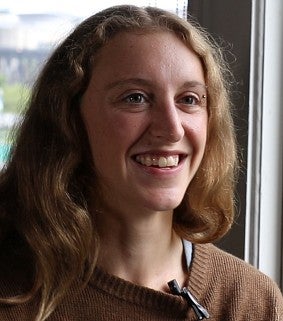In just over a year, Ashley Baker has transformed into a videographer, audio storyteller and photographer, thanks to the multimedia journalism master’s program at the University of Oregon in Portland.
She hasn’t always been a journalist. Baker started her career in the field of chemistry.
“I've always been passionate about getting people excited and engaged around science outside of a classroom setting,” Baker said.
After studying chemistry in college, she went to Washington, D.C. to do communications and outreach work for the American Chemical Society’s Green Chemistry Institute. Through her work, she attended a conference in Portland and fell in love with the city. She decided to stay.

She continued doing communications around sustainable science for nonprofits and found she was more interested in that work instead of traditional lab research. When a chemistry professor at the UO’s main campus encouraged her to apply to the multimedia journalism master’s program in Portland, she jumped at the opportunity.
Andrew DeVigal, Chair in Journalism Innovation and Civic Engagement at the School of Journalism and Communication, said Baker’s background in chemistry adds a unique perspective to the group of students in the program.
“In the master’s program we truly value gathering students from diverse experiences, backgrounds and expertise,” said DeVigal, co-director of the multimedia journalism program at UO Portland. “What’s thrilling about Ashley is that she’s able to bring in a scientist’s point of view for how to tell and communicate stories.”
Baker entered the program without any formal training in journalism or experience in video and audio storytelling.
“This program has gotten me out into the field and interviewing people, finding stories, helping people share their stories, making beautiful videos and working with wonderful people,” Baker said. “It’s been a really good experience so far, and I’m still learning.”
From flying drones and recording audio to creating animated graphics and composing cinematic shots, Baker has had the chance to learn how to use a variety of equipment and techniques throughout the program.
“It's a really useful skill set to have in that combination,” she said. “You don't just end up pigeonholed in one particular expertise, which is nice.”
Using what she’s learned, Baker is producing her final video project for the program before she graduates in 2020.
“I'm excited to finally have the skills to work on making a video about something I'm really passionate about,” Baker said.
The project is an animated explainer video about orthorexia, an eating disorder characterized by obsessing over healthy diets.
“This is a really important topic that affects a lot of people and a huge proportion of athletes,” Baker said. “So I’m trying to shed light on how we can change our messaging around body image, how we feed ourselves and how we fuel our sports so that it's not negatively impacting how athletes see themselves and how they treat their bodies.”
Baker has also used her new multimedia skills to start her own business, doing digital content management, video production and editing.
Since the program is based at the White Stag Block in downtown Portland, Baker said it’s easy to get to and from anywhere in the city or the surrounding suburbs.
“You get to be right in the middle of where a lot of stories are happening,” she added. “So far, I've found that it's been a really supportive community of filmmakers and journalists in Portland.”
—By Emily Lindblom, University Communications

